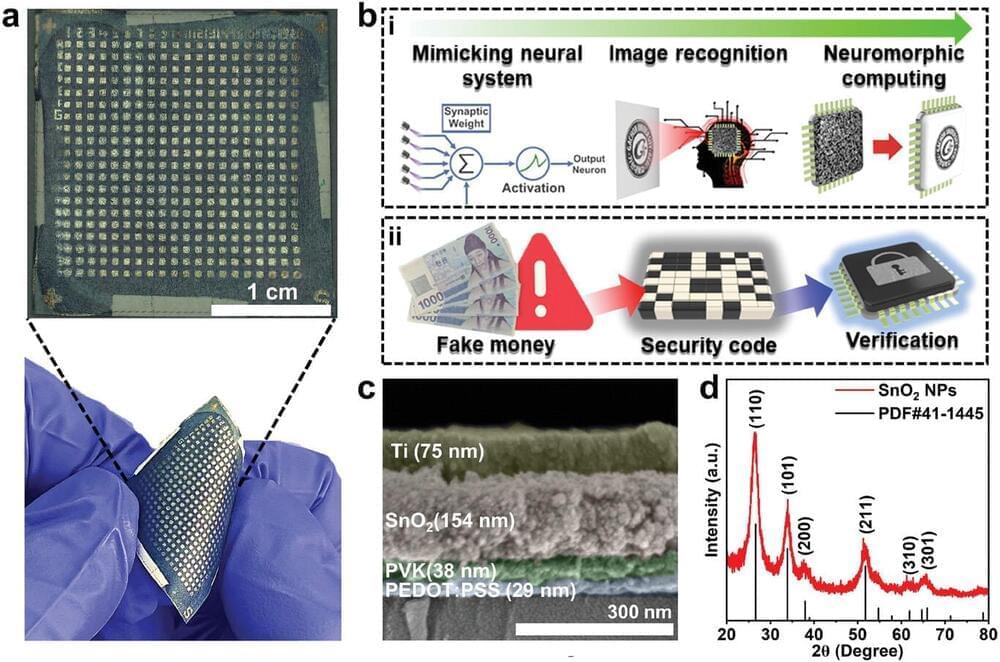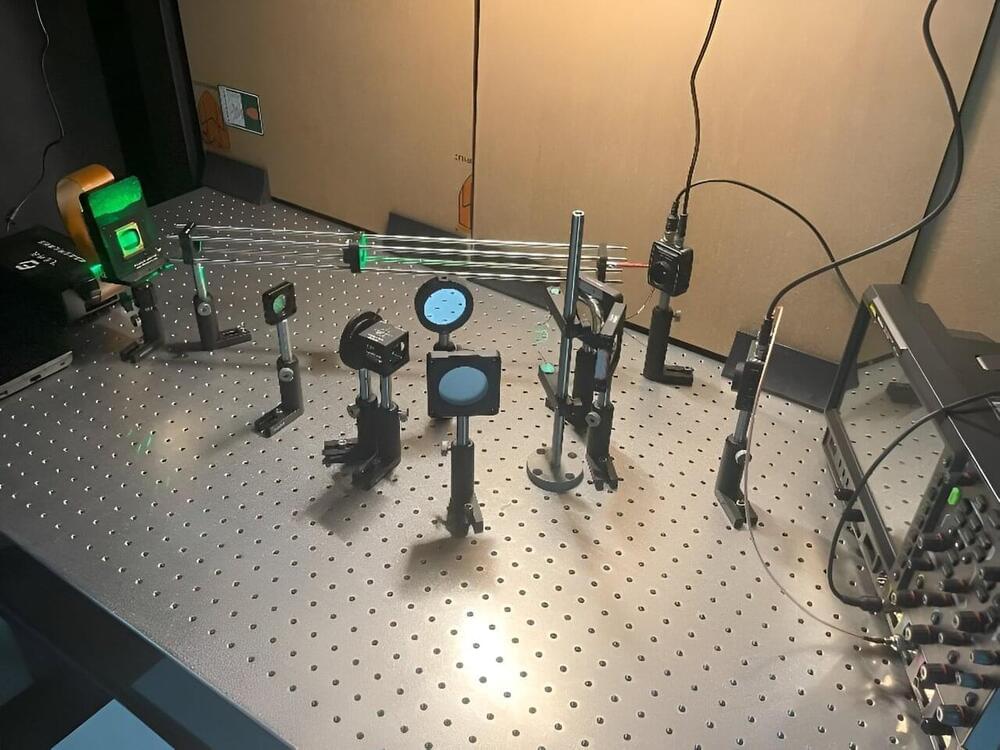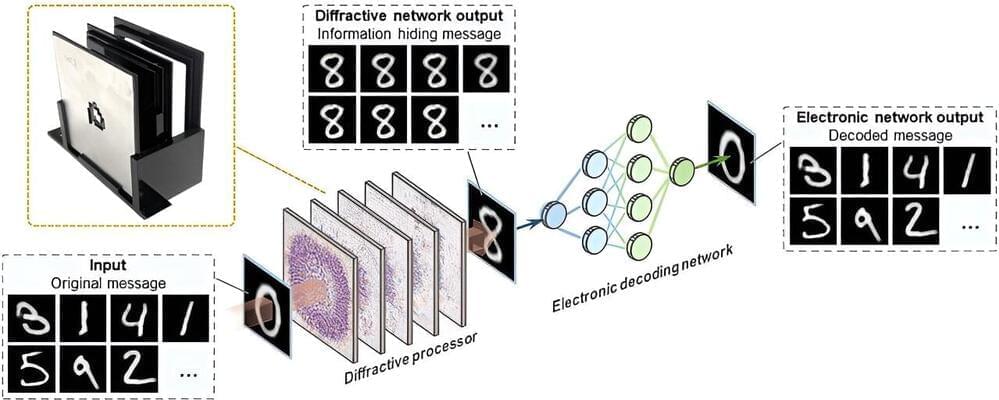Researchers develop versatile paper-based electronic devices demonstrating both neuromorphic computing capabilities and physically unclonable functions for security applications.



face_with_colon_three year 2021.
The solar aircraft is made by a Spanish-American aerospace startup called Skydweller Aero. Based in Oklahoma City, the company raised $32 million in its Series A funding round, led by Italian aerospace firm Leonardo.
“For us, if you’re flying 90 days with one aircraft, that’s two takeoffs and landings versus … hundreds,” Skydweller Aero co-founder John Parkes told Aviation Today. “Being able to fly thousands of miles, persist over an area for 30–60 days and fly back is a differentiator. It’s a huge cost savings to the US government when you look at the whole cost of doing a lot of the national security missions that we have.”
The plane will stay airborne thanks to 2,900 square feet of photovoltaic cells that will blanket its surface, generating up to 2 kilowatts of electricity. As a backup in case it’s cloudy for a few days in a row, the plane will also be equipped with hydrogen fuel cells (maybe they’re not as “extremely silly” as Elon Musk thinks).

For more than 15 years, a group of scientists in Texas have been hard at work creating smaller and smaller devices to “see” through barriers using medium-frequency electromagnetic waves — and now, they seem closer than ever to cracking the code.
In an interview with Futurism, electrical engineering professor Kenneth O of the University of Texas explained that the tiny new imager chip he made with the help of his research team, which can detect the outlines of items through barriers like cardboard, was the result of repeat advances and breakthroughs in microprocessor technology over the better half of the last two decades.
“This is actually similar technology as what they’re using at the airport for security inspection,” O told us.

Watch June’s edition of Inside SingularityNET, featuring exciting news and insightful updates on our AGI R\&D, decentralized AI platform development, progressive decentralization, and broader ecosystem developments.
00:00 — Intro | AI Twin — Dr. Ben Goertzel.
00:48 — Dr. Matt Iklé | CSO — SingularityNET
04:09 — Sergey Shalyapin | CTO — SingularityNET
08:07 — Vita Potapova | Hyperon Project Manager — SingularityNET
13:19 — Alex Blagirev | SIO — SingularityNET
19:10 — Haley Lowy | Marketing Lead — SingularityNET
24:57 — Jan Horlings | CEO — Deep Funding.
31:23 — Esther Galfalvi | Decentralization Program Lead — SingularityNET
34:11 — Peter Elfrink | Community Lead — SingularityNET
35:52 — Stacey Engle | CEO — Twin Protocol.
39:45 — Jennifer Bourke | Marketing and Community Lead — NuNet.
45:02 — Jerry Hall | Marketing Lead — HyperCycle.
47:21 — Patrik Gudev l CEO — Jam Galaxy.
52:23 — Robin Spottiswoode l CTO — Jam Galaxy.
54:40 — Rebekah Pennington | Partnerships and Community — Yaya Labs.
56:03 — Kennedy Schaal | CEO — Rejuve. BIO
#AI #DecentralizedAI #AGI
MeTTa website: https://metta-lang.dev/
Decentralization website: http://decentralizing.singularitynet.io.
Artificial Superintelligence Alliance: https://superintelligence.io/
Rejuve. Bio Crowdsale: http://bit.ly/rjvbcrowdfund.
Disclaimer: Videos published by SingularityNET are meant for informational purposes only and are not intended to serve as a recommendation to buy or sell any security in a self-directed account and are not an offer or sale of a security. Any investment is not directly managed by SingularityNET or Rejuve. Bio. All investments involve risk, and the past performance of a security or financial product does not guarantee future results or returns. Potential investors should seek professional advice and carefully review all documentation before making any investment decisions.
SingularityNET was founded by Dr. Ben Goertzel with the mission of creating a decentralized, democratic, inclusive, and beneficial Artificial General Intelligence (AGI). An AGI is not dependent on any central entity, is open to anyone, and is not restricted to the narrow goals of a single corporation or even a single country.


There are plenty of reasons why Google would be interested in going down this route. For example, closer integration would make Android handsets more compatible with Chromebooks. However, it appears the main reason for the move is to accelerate the delivery of AI features.
As the Mountain View-based firm explains, having Chrome OS lean more on Android’s tech stack will make it easier to bring new AI features to Chromebooks. The company adds that along with the change, it wants to maintain the “security, consistent look and feel, and extensive management capabilities” that users are acquainted with.
Google is working on the updates starting today, but notes that users won’t see the changes for a while. The tech giant claims that when everything is ready, the transition will be seamless.

Researchers at the University of California, Los Angeles (UCLA) have developed an innovative information-hiding camera to optically transform and conceal input images into ordinary-looking patterns, providing a powerful solution for visual information security. The work is published in the journal Science Advances.
Sarah Adams (call sign: Superbad) is a former CIA Targeting Officer and author of Benghazi: Know Thy Enemy. Adams served as the Senior Advisor for the U.S. House of Representatives Select Committee on Benghazi. She conducted all-source investigations and oversight activities related to the 2012 Libya terrorist attacks and was instrumental in mitigating future security risks to U.S. personnel serving overseas. Adams remains one of the most knowledgeable individuals on active terrorism threats around the world.
Get Sarah’s intel briefing via the newsletter: https://shawnryanshow.com/pages/newsl…
Join this channel to get access to perks:
/ @shawnryanshow.
Shawn Ryan Show Links.
SUBSCRIBE: / @shawnryanshow.
Sign up: https://shawnryanshow.com/pages/newsl…
Support the Show: / vigilanceelite.
Download Free Content: https://drive.google.com/drive/folder…
Listen on Apple: https://podcasts.apple.com/us/podcast…
Listen on Spotify: https://open.spotify.com/show/5eodRZd…
Follow on TikTok: / shawnryanshow.